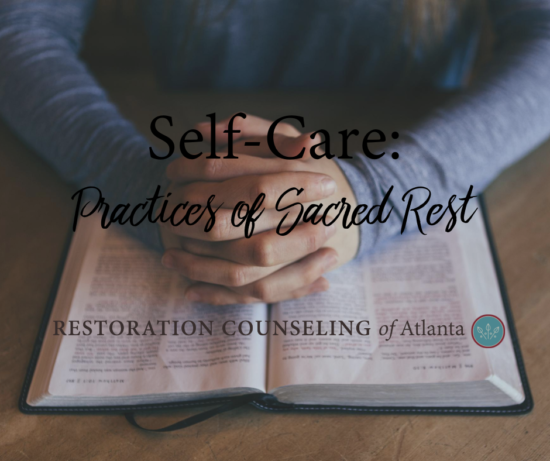It seems that uncertainty has become the operative view for everyone the past few months. If stress was already a present reality before the pandemic hit, we would definitely have some problems now. Many feel a lack assurance and feel powerless over critical areas like our health, income, social connection, and plans for the future. This could easily leave anyone feeling new levels of anxiety and depression.
Self-care is often touted as a remedy:
- “Drink enough water.”
- “Get enough sleep.”
- ”Eat right.”
- “Exercise.”
These are all things we know we need to do to take care of ourselves physically, but do we know as easily what we need to do to take care of ourselves emotionally or spiritually? Somehow meeting a physical need feels justified, but engaging in something non-productive for my soul – isn’t that more along the lines of a luxury?
Doing a Bible search on “Self-care” doesn’t yield many results with that term, but we can see examples of Jesus modeling self-care because he knew his purpose depended on it.
- “Very early in the morning, while it was still dark, Jesus got up, left the house and went off to a solitary place, where he prayed.” – Mark 1:35 NIV
- Jesus removed himself from others and called his disciples to do the same. “Then, because so many people were coming and going that they did not even have a chance to eat, he said to them, ‘Come with me by yourselves to a quiet place and get some rest.’ So they went away by themselves in a boat to a solitary place.” – Mark 6:31-32 NIV (also see Matthew 14:13 and John 6:30)
- In Genesis 2, scripture tells us that after God completed creation, he rested.
Looking from a holistic lens, true self-care is more than restoring my body. Soul care or sacred rest is also about restoring my mind, soul, and spirit. All aspects of our being are important. Each aspect affects another. Failure to meet these inherent needs can result in symptoms of anxiety, depression, anger, or physical problems. As I work with others, I see that failure to care for ourselves properly also results in unhealthy relationships, bad habits, and addictive patterns.
What we can see in scripture is that God cares for us. Jesus cares for us spiritually by coming to earth to “seek and save the lost” (Luke 19:10). He had compassion for and healed the sick (Matthew 14:14), fed the hungry (Matthew 15: 32) and restored value and worth to the outcasts like the Samaritan woman (John 4), the bleeding woman (Mark 5) and the paralyzed man (Mark 2). Psalms 23 reminds us that God is our Shepherd who carefully provides for us. Hebrews 4:15 tells us that Jesus understands our weaknesses and has grace for us when we approach Him.
True self-care begins and ends with God. If God created us, then certainly He knows our needs better than even we do and planned from the beginning to be the provider of our needs. Our understanding of God’s love for us; that He initiates the care that we need is what allows us to experience rest. Often WE try to achieve rest, maybe by zoning out with our devices, going on a vacation, eating, or buying another thing. Eventually, we realize these attempts only provide short term rest.
Without an ability to relax confidently in the knowledge that God’s care is always the best for me and it has nothing to do with me (what I can achieve, do, or not do), I will stay in performance mode. By definition, I will not rest because there will always be that string attached telling me there is something that I have to do to “earn it”, “deserve it”, or “maintain it”.
Rest cannot be earned. It is freely and abundantly provided by our Lord who says “Come to me, all you who are weary and burdened, and I will give you rest. Take my yoke upon you and learn from me, for I am gentle and humble in heart, and you will find rest for your souls. For my yoke is easy and my burden is light.” (Matthew 11:29-30 NIV emphasis added). We cannot find rest by searching for it, we must lean into God trusting in who He says he is to receive rest.
Since around the third century, our ancestors in the faith understood that practices help us to slow down enough to receive the rest that God promises for us. Contemplative practices help us to achieve the goal of prayer which is to be in relationship; listening and talking; not just asking God for our needs. These early faith practices can vary a bit.
- One called Lectio Divina (“Divine Reading”) focuses on:
- Reading a scripture passage slowly and carefully in context
- Meditation: thinking deeply upon the text perhaps looking for one word or phrase that stands out
- Prayer: having a loving conversation with God
- Contemplation: resting in God’s presence (Some practice these first four steps three times in a setting, learning that new insights are gained each time they return to meditate on a passage.)
- Action: go and do likewise
- Another called Centering Prayer is a stance where we prepare our mind to be present to the moment; centered on the presence of God and our body to be relaxed perhaps through mindful breathing. Knowing that our mind wanders, we gently redirect it back to present awareness of our body and sensations. Some would say that Centering Prayer prepares us for Contemplative Prayer.
- Contemplative Prayer focuses on a sacred word that best supports your intention to be in the Lord’s presence. Perhaps a word like “Abba”, “Yes, Lord”, or “Thank you, Jesus”. Some seek a word that feels right to them, some let the word find them. Others have called it the “gaze of faith” or “a silent love”. Some would say that Contemplative prayer begins with Centering Prayer.
To learn more about these practices for spiritual formation and have access to wonderful resources, visit Soul Shepherding.org (https://www.soulshepherding.org/). Using a quiet timer that doesn’t startle you (I use the app Insight Timer) to provide boundaries around the time that you know you have to commit to a practice can help your mind to not wonder if you’ve lost sight of upcoming responsibilities. Developing these practices are a bit like training a puppy. Short sessions, low expectations, and a loving non-judgemental stance are all important.
In I Kings 19:12, we see that the Lord spoke to Elijah in a “still, small voice” of intimate, personal communion. David values this type of spiritual discipline in Psalm 4:4 where he says, “Meditate within your heart on your bed, and be still.” We are also challenged in Psalm 46:10 to “be still and know that I am God”. The emphasis for rest here is in what we focus on, not just in being still. Know in the original language (Yada) implies intimacy, not just head knowledge. So it is as with any intimate relationship, talking and listening is required for any relational depth to be achieved.
My prayer for you is that you would be curious about deepening your relationship with God and would make a way to slow down so you can be still and listen for the still small voice waiting to be heard inside of you.
Roswell Location
Debbie Turner received her Master’s in Marriage and Family Therapy from Richmont Graduate University; an academically sound, Christ-centered program. She is passionate about helping individuals and couples learn new ways of connecting with Christ and others to facilitate healing, transformation, and restoration.
Debbie has also completed training from Postpartum Support International. She is qualified to assess and treat women struggling with issues like depression, anxiety, anger, intrusive thoughts, or repetitive behaviors that can occur during pregnancy or after delivery.


 by
by